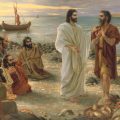Brigham Young University’s Honor Code has been the subject of much derision over the years for its seemingly over-the-top restrictive standards on grooming, dress, and behavior. No drinking alcohol, coffee, or tea. No using illegal drugs. No premarital sex. No beards unless the guy has a beard waiver. BYU—which is the flagship academic institution for The Church of Jesus Christ of Latter-day Saints (sometimes mistakenly called the Mormon Church)—is a different kind of college experience. A stone cold sober one. And it was always meant to be that way.
When BYU made changes to the Honor Code in February 2020, some people took it to mean that the school—and the Church—were loosening their standards to better reflect the whatever-feels-good-to-me-should-be-OK mentality that is so prevalent today. But that is not the case. The principles and doctrines of the gospel are not changing. BYU’s Honor Code was updated in coordination with the updated Church Handbook. BYU stated,
With the recently released general handbook of The Church of Jesus Christ of Latter-day Saints, the Church Educational System has updated the CES Honor Code to be in alignment with the doctrine and policies of the Church. …
The updated Honor Code continues to be a principle-based code that reflects the moral standards of the Church. It allows each campus to support and guide its students on an individual basis according to the principles outlined in the Honor Code.
So what, exactly, is the message that The Church of Jesus Christ is trying to send? It’s simple. It’s time for Latter-day Saints—especially the youth—to take personal revelation to the next level. The prophet is encouraging us to live a higher law focused more on the spirit rather than the letter. Let me explain.
Personal Revelation
The prophet and apostles of The Church of Jesus Christ have been emphasizing the importance of each member learning how to receive his or her own personal revelation. President Russell M. Nelson taught,
… In coming days, it will not be possible to survive spiritually without the guiding, directing, comforting, and constant influence of the Holy Ghost.
Why would this be? President Nelson explained,
We live in a world that is complex and increasingly contentious. The constant availability of social media and a 24-hour news cycle bombard us with relentless messages. If we are to have any hope of sifting through the myriad of voices and the philosophies of men that attack truth, we must learn to receive revelation.
With the onslaught of opinions, information, and misinformation, personal revelation is the only way to truly be able to sift through the myriad of voices. So, what is personal revelation? It is the way that God speaks to each one of us individually. Elder Robert D. Hales said,
Personal revelation is the way we know for ourselves the most important truths of our existence: the living reality of God, our Eternal Father, and His Son, Jesus Christ; the truthfulness of the restored gospel; and God’s purpose and direction for us.
God will speak to each one of us through the power of the Holy Ghost, but the way in which the Holy Ghost speaks to each person will be different. So not only is it important to understand what revelation is, we must also learn how to receive it. And although the Holy Ghost will speak to us in different ways, there are commonalities in the way we must approach this process.
The Boundaries of the Gospel
It is important for us to put ourselves in a position to receive personal revelation. And this begins with keeping the commandments. In each law of the gospel there is the letter and the spirit. The spirit of the law is a higher way of following it. At the time of the Savior, many Jews were fixated on the cold scrutiny of the law that didn’t leave room for the spiritual aspect of it. They looked to their religious leaders to tell them exact steps for following the law. But that was never the intent. The Law of Moses was implemented to help them prepare spiritually for the higher law, which built upon the lesser law. Elder James E. Faust said,
Jesus introduced a higher and more difficult standard of human conduct. It is simpler as well as more difficult because it focuses on internal rather than external requirements: … Love your neighbor as yourself. When smitten, turn the other cheek. … Forgive, not just once but seventy times seven. This was the essence of the new gospel. There was more emphasis on do than do not.
The Jews were so focused on the boundaries of the gospel that they couldn’t see the reason behind it, which was to bring them closer to God and becoming like the Savior. We make the same mistake when we seek for everything to be spelled out for us. Elder Boyd K. Packer explained,
… It is a mistake to assume that anything not specifically prohibited in the “letter of the law” is somehow approved of the Lord. All the Lord approves is not detailed in the scriptures, neither is all that is forbidden. The Word of Wisdom, for instance, makes no specific warning against taking arsenic. Surely we don’t need a revelation to tell us that!
The Whys of the Gospel
What is the purpose of the gospel of Jesus Christ? It is the same today as it was in the ancient church that Jesus Christ established when He was on the earth. Elder D. Todd Christofferson said,
The ancient purpose remains: that is, to preach the good news of the gospel of Jesus Christ and administer the ordinances of salvation—in other words, to bring people to Christ. …
It is important to recognize that God’s ultimate purpose is our progress. His desire is that we continue “from grace to grace, until [we receive] a fulness” of all He can give. That requires more than simply being nice or feeling spiritual. It requires faith in Jesus Christ, repentance, baptism of water and of the Spirit, and enduring in faith to the end.
But the requirement is more than just learning. It is becoming. President Dallin H. Oaks explained,
The Apostle Paul taught that the Lord’s teachings and teachers were given that we may all attain “the measure of the stature of the fulness of Christ” (Ephesians 4:13). This process requires far more than acquiring knowledge. It is not even enough for us to be convinced of the gospel; we must act and think so that we are converted by it. In contrast to the institutions of the world, which teach us to know something, the gospel of Jesus Christ challenges us to become something. …
It is not enough for anyone just to go through the motions. The commandments, ordinances, and covenants of the gospel are not a list of deposits required to be made in some heavenly account. The gospel of Jesus Christ is a plan that shows us how to become what our Heavenly Father desires us to become.
The Whys of the Honor Code
In a similar manner, the Honor Code challenges BYU students to become more than they were before by choosing to live by a higher standard. Cecil O. Samuelson, at the time president of BYU, said,
All of us are beset with ideas, temptations, and distractions that have the potential to lead us to places we do not wish to go and to consequences we would not choose. The Word of Wisdom was given “in consequence of evils and designs which do and will exist in the hearts of conspiring men [and women] in the last days [our days]” (Doctrine & Covenants 89:4). It is my judgment that this is also a major reason for the development of the Honor Code at Brigham Young University.
College life is often associated with drinking, parties, premarital sex and illicit drug use—which can lead to poor performance in studies, among other issues. But campus life is different at BYU. Samuelson continued,
Included in the many blessings that a BYU education and experience may provide is the opportunity to understand and reflect carefully on what things in life are most important to us. This occurs in an environment where sacred things are held sacred and where we are committed to helping each other understand and apply eternal truths as we strive and grow in the quest for academic and scholarly excellence.
In addition, like the Word of Wisdom, the Honor Code is not primarily a law of health or blind conformity. It is a principle of obedience. It is an outward manifestation of our inner appreciation for and understanding of the privilege of being at BYU.
The BYU experience is unique. And acceptance into it is a privilege that should not be taken lightly.
The BYU Experience
What makes the BYU experience so unique? A combination of factors. Students receive a top-notch education in a spiritually rich environment with others who not only share the same faith in God but also commit to live the standards of the Honor Code. And because BYU is subsidized by tithing funds from The Church of Jesus Christ, the students benefit from the faithful sacrifice of church members. That is a powerful combination that creates a different feeling for the campus and a unique environment for students. Speaking to an audience of BYU students, President Gordon B. Hinckley said,
Every one of you who is enrolled in this great institution and everyone who is a member of its faculty or its staff is part of a family unique and unusual. You are, in a very real sense, a chosen people. You have been selected through a rigorous process and found to be deserving of what this institution has to offer. That offering includes the opportunity for a first-class education for the students and a wonderful teaching environment and challenge for the faculty.
Much has been given; much is expected; and I am grateful to be able to say that the response on the part of most of the faculty and students is overwhelmingly in full and complete accord with the principles of the Honor Code, as well as the Dress and Grooming Standards. …
I am sorry that we cannot accommodate all who wish to come here. But I am grateful that the university is so successful in accomplishing its twin objectives—of imparting first-class secular education combined with the teaching and advocacy of the gospel of Jesus Christ—that many more than we can possibly accommodate wish to come and drink at these waters.
BYU and Tithing Funds
The use of tithing funds in the operations of Brigham Young University is a source of faith and spiritual power for the campus that can’t be overlooked. Members of the Church pay 10% of their annual increase as tithing. That money is used by the Church for specific purposes, including educational institutions. Why is this? President Hinckley taught,
… We do have tremendous assets when the value of all Church buildings and facilities is included. But these assets are not income producing. They are consumers. They consist of thousands of meetinghouses across the world, many temples, seminaries and institutes, and, of course, Brigham Young University. They have cost millions in investments, and they produce scarcely anything in the way of a direct dollar return on those investments. There is only one reason for their existence, and that is to serve the needs of people as sons and daughters of God who have a peculiar and important relationship with him.
Tithing is a sacrifice unto the Lord to fulfill His purposes. And BYU students are the beneficiaries of this sacrifice. President Hinckley explained,
Most of the wonderful, faithful Latter-day Saints who pay their tithing are men and women of modest means. They not only pay their tithing, but they also make many other contributions for the strengthening of this work. …
My dear young friends, we—you and I—are trustees of that which has been given to the Lord by [church members] … whose devotion is as great [as the widow and her mite] and whose sacrifice is as certain. This beautiful campus, with its many programs, is a consumer of a very substantial portion of the widow’s contribution. She gives her offering to the Lord, and she is then released from responsibility. The responsibility then becomes mine—and yours!
A Community of Saints—and BYU Cougars

Members of the BYU Wind Symphony went on tour in Australia and not only performed concerts but also went to work doing service, including clearing overgrown weeds and plants from footpaths.
The shared sacrifice and working together to accomplish the work of the Lord creates a community of Saints. Elder Christofferson said,
… A major reason the Lord has a church is to create a community of Saints that will sustain one another in the “strait and narrow path which leads to eternal life.” …
We are told that the ancient Church “did meet together oft, to fast and to pray, and to speak one with another concerning the welfare of their souls” “and to hear the word of the Lord.” So it is in the Church today. Joined in faith, we teach and edify one another and strive to approach the full measure of discipleship, “the measure of the stature of the fulness of Christ.” We strive to help one another come to “the knowledge of the Son of God.”
Although the community is one in purpose, we are still all people. And people make mistakes. Elder Christofferson taught,
In the Church we not only learn divine doctrine; we also experience its application. As the body of Christ, the members of the Church minister to one another in the reality of day-to-day life. All of us are imperfect; we may offend and be offended. We often test one another with our personal idiosyncrasies. In the body of Christ, we have to go beyond concepts and exalted words and have a real “hands-on” experience as we learn to “live together in love.”
Learning to “live together in love” creates a community of Saints—and a community of Cougars at BYU. This community is enhanced when all are striving for the same goals of honoring their commitments to follow the Honor Code.
The Honor Code and Personal Revelation
So how does this relate to personal revelation? President Hinckley said,
[The Honor Code] is not an inflexible law written in tablets of stone. It is a code of conduct. It is a statement of principles. It is a guide and a reminder concerning expected deportment. It is no more than might be expected of any good Christian, and no less than might be required of one who comes to this great institution sponsored by The Church of Jesus Christ of Latter-day Saints. The code is a guide, not a rigid set of rules. It does not address every specific issue. It is a table of standards, set forth clearly enough that there can be no question concerning what is expected and yet flexible enough to allow some freedom in application.
The Honor Code and the Church Handbook are tools to help those who have made commitments to keep their commitments. The Honor Code, especially, is a reminder of those commitments and how we can grow closer to Christ. President Hinckley explained,
Every one of us who is here has accepted a sacred and compelling trust. With that trust, there must be accountability. That trust involves standards of behavior as well as standards of academic excellence. For each of us it carries with it a larger interest than our own interest. It carries with it the interest of the university, and the interest of the Church, which must be the interest of each and all of us.
Keeping the commitment to the Honor Code helps students open the path to personal revelation. And when we are open to personal revelation and the gifts of the spirit, we don’t need to have every detail spelled out for us. Because, as the Prophet Joseph Smith once said,
I teach them correct principles, and they govern themselves.







